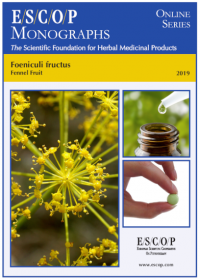
ESCOP monographs The Scientific Foundation for Herbal Medicinal Products. Online series. Foeniculi fructus (Fennel fruit). Exeter (UK): ESCOP; 2019.
Published 30/5/2019
Format: PDF
SUMMARY
The herbal monograph selects and summarises scientific studies and textbooks regarding efficacy, dosage and safety to support the therapeutic uses of fennel fruit.
This herbal drug by definition consists of the dry whole cremocarps and mericarps of Foeniculum vulgare Miller ssp vulgare var vulgare (bitter-fennel fruit) and Foeniculum vulgare Miller ssp vulgare var dulce (Miller) Thellung (sweet fennel fruit).
Studies with its main characteristic constituents anethole and fenchone are included.
The therapeutic indications are dyspeptic complaints such as mild, spasmodic gastro-intestinal ailments, bloating and flatulence and catarrh in the upper respiratory tract.
Administration of fennel fruit addresses posology; its duration of use; contra-indications; special warnings; special precautions for use; interactions with other medicinal products; other forms of interaction; in pregnancy and lactation; its effects on ability to drive; undesirable effects; overdose.
In vitro experiments with fennel fruit and its extracts demonstrated antimicrobial, antioxidant, secretolytic, expectorant, anticoagulant, spasmolytic and local anaesthetic effects. Anethole showed a tumour-inhibiting effect.
In vivo experiments with fennel fruit and its extracts in animals showed secretolytic, expectorant, anti-inflammatory, oestrogenic, antifertility, analgesic, hypotensive and anti-genotoxic properties. It increased spontaneous movement of the stomach and increased gastric acid secretion.
Controlled clinical studies, conducted with fennel fruit extracts, treated idiopathic hirsutism and patients with dysmenorrhoea.Preclinical safety data were assessed in toxicity studies. Aqueous and methanolic extracts of fennel fruit were negative in the Ames test. Trans-anethole exerted anti-implantation activity and was weakly mutagenic in the Ames test. Safety data were assessed in human studies. No side effects were reported.
The selection of literature cited in the monograph is aimed at bringing together relevant information about the possible physiological roles of fennel fruit and its major constituents
KEYWORDS
Foeniculum vulgare Miller ssp vulgare var vulgare
Foeniculum vulgare Miller ssp vulgare var dulce
Foeniculi fructus
Fennel fruit
Dyspeptic complaints
Bloating
Flatulence
Catarrh of the upper respiratory tract



